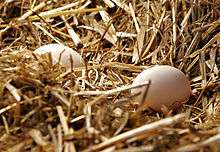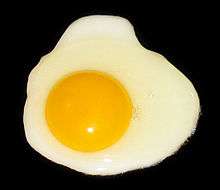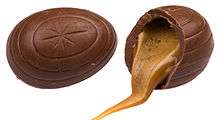English

Chicken eggs in a nest

An egg being cooked for food

An Easter egg made of chocolate and caramel
Noun
egg (plural eggs)
- (zoology, countable) An approximately spherical or ellipsoidal body produced by birds, reptiles, insects and other animals, housing the embryo during its development.
- (countable, uncountable) The egg of a domestic fowl (especially a hen) or its contents, used as food.
- I also determine the minimal amount of egg required to make good mayonnaise.
- We made a big omelette with three eggs.
- The farmer offered me some fresh eggs, but I told him I was allergic to egg.
- (biology, countable) The female primary cell, the ovum.
- Anything shaped like an egg, such as an Easter egg or a chocolate egg.
- A swelling on one's head, usually large or noticeable, associated with an injury.
- (mildly pejorative, slang, ethnic slur), (potentially offensive) A person of Caucasian (Western) ancestry, who has a strong desire to learn about and immerse him- or herself in East Asian culture, and/or such a person who is perceived as behaving as if he or she were Asian (from the "white" outside and "yellow" inside).
- (New Zealand, pejorative) A foolish or obnoxious person.
- Shut up, you egg!
- (informal) A person, fellow.
- good egg
- bad egg
- tough egg
Derived terms
Translations
body housing an embryo
- Abenaki: wôwan
- Abkhaz: акәтаӷь (āḳwṭāγ̍)
- Adyghe: кӏэнкӏэ (č̣̍ănč̣̍ă), (Shapsug) кӏьакӏьэ (č̣̍’āč̣̍’ă)
- Afrikaans: eier (af)
- Akan: nkesua, kosua
- Akkadian: 𒉭 (pelû)
- Akkala Sami: mann
- Arabic: بَيْضَة (ar) f (bayḍa)
- Egyptian Arabic: بيضة f (beḍa)
- Aragonese: güego m, uevo (an) m
- Armenian: ձու (hy) (ju), հավկիթ (hy) (havkitʿ)
- Old Armenian: ձու (ju), հաւկիթ (hawkitʿ)
- Middle Armenian: ձու (ju)
- Aromanian: ou (roa-rup) n
- Assamese: কণী (kaṇī)
- Asturian: güevu (ast) m
- Avar: хоно (χono)
- Avestan: 𐬀𐬉𐬨 (aēm)
- Aymara: k'awna
- Azeri: yumurta (az)
- Balinese: taluh
- Banjarese: hintalu
- Bashkir: йомортҡа (yomortqa)
- Basque: arrautza, arraultza
- Bau Bidayuh: turuoh
- Belarusian: я́йка n (jájka), яйцо́ n (jajcó)
- Bengali: ডিম (ḍim)
- Bikol Central: sogok (Naga), bunay (Legazpi)
- Blackfoot: oowaa
- Breton: vi (br) m
- Buginese: təllo
- Bulgarian: яйце́ (bg) n (jajcé)
- Burmese: ဥ (my) (u.)
- Catalan: ou (ca) m
- Cebuano: itlog
- Central Melanau: teloh
- Chechen: хӏоа (hoa)
- Cherokee: ᎤᏪᏥ (chr) (uwetsi)
- Chichewa: dzìlà, mazìlà
- Chinese:
- Cantonese: 卵 (leon5⁻2)
- Hakka: 卵 (lón)
- Mandarin: 卵子 (zh) (luǎnzǐ)
- Min Nan: 卵 (zh-min-nan) (nn̄g)
- Chuvash: ҫӑмарта (śămarta)
- Cornish: oy m
- Cree: ᐋᐧᐃᐧ (wâwi)
- Crimean Gothic: ada
- Czech: vejce (cs) n
- Dalmatian: juf m
- Danish: æg (da) n
- Dhivehi: ބިސް (bis)
- Dogrib: eyè
- Dolgan: һымыыт (hımııt)
- Dutch: ei (nl) n
- Egyptian: swḥt
-
- Emilian: óv m
- Erzya: ал (al)
- Esperanto: ovo (eo)
- Estonian: muna (et)
- Evenki: умукта (umukta)
- Faroese: egg n
- Finnish: muna (fi)
- French: œuf (fr) m
- Friulian: ûf m, ûv m
- Gagauz: yımırta
- Galician: ovo (gl) m
- Gamilaraay: gawu
- Georgian: კვერცხი (ḳvercxi)
- German: Ei (de) n
- Gothic: 𐌰𐌳𐌳𐌹 n (addi)
- Greek: αβγό (el) n (avgó)
- Ancient Greek: ᾠόν n (ōión)
- Greenlandic: mannik
- Gujarati: ઇંડા m (iṇḍā)
- Haitian Creole: ze
- Harsusi:
- Hawaiian: hua
- Hebrew: בֵּיצָה (he) f (beitzá)
- Hiligaynon: itlog
- Hindi: अंडा (hi) m (ãṇḍā)
- Iban: telu
- Icelandic: egg (is) n
- Ido: amniotala ovo, ovo (io)
- Ilocano: itlog
- Indonesian: telur (id)
- Ingush: фуъ (fuʾ)
- Interlingua: ovo (ia)
- Interlingue: ove
- Inuktitut: ᒪᓐᓂᒃ (mannik), ᒪᖕᓂᒃ (mangnik)
- Inupiak: mannik
- Irish: ubh (ga) f
- Old Irish: og n
- Italian: uovo (it) m
- Jamaican Creole: eg
- Japanese: 卵 (ja) (たまご, tamago), 玉子 (ja) (たまご, tamago)
- Javanese: enḍog
- Kabardian: джэдыкӏэ (ǯ̍ădəč̣̍ă)
- Kalmyk: өндгн (öndgn)
- Kannada: ಮೊಟ್ಟೆ (kn) (moṭṭe)
- Kapampangan: ebun
- Karelian: jaiču
- Kashubian: jaje n, jajco n
- Kazakh: жұмыртқа (kk) (jumırtqa)
- Khakas: нымырха (nımırxa)
- Khmer: ស៊ុត (km) (sut), ពង (km) (pɔɔŋ)
- Khotanese: 𐨀𐨱𐨀
- Kimaragang: tontolu
- Kinaray-a: itlog
- Komi-Permyak: кольть (kolʹtʹ)
- Korean: 달걀 (ko) (dalgyal)
- Kriol: eig
- Kurdish:
- Kurmanji: hêk (ku) f
- Sorani: هێک (hêlke)
- Kyrgyz: жумуртка (ky) (cumurtka)
- Ladino: guevo m
- Lao: ໄຂ່ (lo) (khai)
- Latgalian: ūla
- Latin: ovum (la) n
- Latvian: ola (lv) f
- Ligurian: övo m
- Limburgish: ei (li) n
- Lingala: likeí class 5/6, líki class 5/6
- Lithuanian: kiaušinis (lt) m
- Lojban: sovda
- Lombard: öv m
- Luganda: miga
- Luxembourgish: Ee (lb) n
- Macedonian: јајце n (jajce)
|
|
- Madurese: tellor
- Malagasy: atody (mg)
- Malay: telur (ms)
- Malayalam: മുട്ട (ml) (muṭṭa)
- Malecite-Passamaquoddy: wawon
- Maltese: bajda f
- Mansi: мӯӈи (mūňi)
- Manx: ooh f
- Maranao: laman, bigà, orak
- Mari:
- Eastern Mari: муно (muno)
- Massachusett: wôu, wóóu
- Miami: waawi
- Middle Dutch: ei
- Minangkabau: talua
- Mirandese: uobo m
- Mohegan-Pequot: wôm
- Moksha: ал (al)
- Mongolian: өндөг (mn) (öndög)
- Monguor: ndige
- Muong: tlởng
- Nahuatl: tōtoltetl (nah)
- Navajo: ayęęzhii
- Neapolitan: ovo m
- Newari: खेँय् (khēm̐y)
- Ngarrindjeri: ngatat
- Norman: (Jersey) oeu m, (Normandy) œu m, (Guernsey) œu m
- Norwegian:
- Bokmål: egg (no) n
- Nynorsk: egg n
- Occitan: uòu (oc) m
- Ojibwe: waawan
- Old Church Slavonic:
- Cyrillic: аицє n (aice)
- Glagolitic: ⰰⰹⱌⰵ n (aice)
- Old English: ǣġ n
- Oriya: ଅଣ୍ଡା (aṇḍā)
- Osage: hpáata
- Ossetian: айк (ajk), айкӕ (ajkæ)
- Pangasinan: iknol
- Papiamentu: webu
- Persian: تخم (fa) (toxm), (chicken egg) تخم مرغ (fa) (toxm-e morğ)
- Picard: uë m
- Plautdietsch: Ei (nds)
- Polabian: joji n
- Polish: jajo (pl) n, jajko (pl) n
- Portuguese: ovo (pt) m
- Quechua: runtu
- Romanian: ou (ro)
- Romansch: ov m, iev m, öv m
- Russian: яйцо́ (ru) n (jajcó)
- Rwanda-Rundi: igi, iri-gi
- Samoan: fua
- Samogitian: kiaušis m
- Sanskrit: अण्ड (sa) n (aṇḍa)
- Sardinian: obu m, (Campidanese) ou
- Saterland Frisian: Oai n
- Scottish Gaelic: ugh m
- Serbo-Croatian:
- Cyrillic: јајце n
- Roman: jajce (sh) n
- Shona: zai
- Sicilian: ovu (scn) m, ou (scn) m, uòvu m
- Sindhi: آنو (aano)
- Sinhalese: බිත්තර (si) (bittara)
- Skolt Sami: mââʹnn
- Slovak: vajce n
- Slovene: jajce (sl) n
- Slovincian: jȧ̃jä n
- Somali: ukun (so) f
- Sorbian:
- Lower Sorbian: jajo n
- Upper Sorbian: jejo n
- Sotho: lehe
- Southeastern Nochixtlán Mixtec: ndɨvị
- Southern Altai: јымыртка (cımırtqa)
- Southern Sami: munnie
- Spanish: huevo (es) m
- Sundanese: ᮈᮔ᮪ᮓᮧᮌ᮪ (endog)
- Swabian: Oi
- Swahili: yai (sw)
- Swedish: ägg (sv) n
- Tagal Murut: talu'
- Tagalog: itlog (tl)
- Tajik: тухм (tg) (tuxm)
- Talysh:
- Asalemi: اگله (ogla)
- Tamil: முட்டை (ta) (muṭṭai), இலீக்கை (ilīkkai), இலீக்கை (ilīkkai)
- Taos: p’ȍxwíana
- Tatar: йомырка (tt) (yomırka)
- Tausug: iklug
- Telugu: గుడ్డు (te) (guḍḍu)
- Thai: ไข่ (th) (khai)
- Tibetan: སྒོང་ང (sgong nga)
- Tok Pisin: kiau
- Tolai: kiau
- Tswana: lee
- Turkish: yumurta (tr)
- Turkmen: ýumurtga
- Tuvan: чуурга (čuurga)
- Uab Meto: tekô, tenô
- Udmurt: пуз (puz)
- Ukrainian: яйце́ (uk) n (jajcé)
- Unami: òòl
- Urdu: انڈا m (ãṇḍā)
- Uyghur: تۇخۇم (tuxum)
- Uzbek: tuxum (uz)
- Venda: gumba
- Venetian: óvo m, ou (vec) m, ovo m, vóvo m
- Veps: muna
- Vietnamese: trứng (vi)
- Vilamovian: e n
- Volapük: nög (vo)
- Voro: muna
- Votic: muna
- Walloon: oû (wa) m
- Waray-Waray: bunay
- Wardaman: jarrug
- Welsh: ŵy (cy) m
- Old Welsh: ui
- Middle Welsh: wy
- West Frisian: aai (fy) n
- White Hmong: qe
- Wiradhuri: kubbuga
- Wolof: nen (wo)
- Xhosa: iqanda class 5/6
- Yakut: сымыыт (sımııt)
- Yiddish: איי n (ey)
- Yoruba: ẹyin
- Yucatec Maya: e'el
- Yup'ik: kayangaq
- Zazaki: hak
- Zhuang: gyaeq
- Zulu: iqanda (zu) class 5/6
|
egg of domestic fowl as food item
- Abkhaz:
- Afrikaans: eier (af)
- Ancient Greek: ᾠόν n (ōión)
- Aneme Wake: urími
- Arabic: بَيْضَة (ar) f (bayḍa)
- Armenian: ձու (hy) (ju), հավկիթ (hy) (havkitʿ)
- Aromanian: ou (roa-rup) n
- Asturian: güevu (ast) m
- Avar:
- Bashkir: йомортҡа (yomortqa)
- Basque: arrautza, arraultza
- Bats: გაგაჼ (gagaჼ)
- Bengali: ডিম (ḍim)
- Borôro: ba
- Bulgarian: яйце (bg) n (jajce)
- Burmese: ဥ (my) (u.)
- Central Atlas Tamazight: ⵜⴰⴳⵍⴰⵢⵜ (taglayt)
- Chechen:
- Chinese:
- Cantonese: 蛋 (daan6⁻2), (chicken egg) 雞蛋, 鸡蛋 (gai1 daan6⁻2)
- Hakka: 卵 (lón), 雞卵, 鸡卵 (kiê-lón)
- Mandarin: 蛋 (zh) (dàn), (chicken egg) 雞蛋 (zh), 鸡蛋 (zh) (jīdàn)
- Min Nan: 卵 (zh-min-nan) (nn̄g), (chicken egg) 雞卵 (zh-min-nan), 鸡卵 (ke-nn̄g, kue-nn̄g)
- Cornish: oy m
- Creek: custake
- Czech: vejce (cs) n
- Dalmatian: juf m
- Danish: æg (da) n
- Dutch: ei (nl) n
- Eshtehardi: کرخا (karxâ)
- Estonian: muna (et)
- Faroese: egg n
- Finnish: muna (fi); kananmuna (fi) (hen's egg)
- Franco-Provençal: uef
- French: œuf (fr) m
- Friulian: ûf, ûv m
- Georgian: კვერცხი (ḳvercxi)
- German: Ei (de) n
- Greek: αβγό (el) n (avgó)
- Greenlandic: mannik
- Hawaiian: hua moa
- Hebrew: בֵּיצָה (he) f (beitzá)
- Hiligaynon: itlog
- Hungarian: tojás (hu)
- Icelandic: egg (is) n
- Ido: ovo (io)
- Irish: ubh (ga) f
- Old Irish: og n
- Italian: uovo (it) m
- Jamaican Creole: eg
- Japanese: 卵 (ja) (たまご, tamago), 玉子 (ja) (たまご, tamago)
- Khmer: ស៊ុត (km) (sut), ពង (km) (pɔɔŋ)
- Korean: 계란 (ko) (gyeran) (chicken egg), 달걀 (ko) (dalgyal)
- Lao: ໄຂ່ (lo) (khai)
- Latin: ovum (la) n
- Latvian: ola (lv) f
- Lithuanian: kiaušinis (lt) m
- Lombard: öv m
- Luhya: liki
|
|
- Luxembourgish: Ee (lb) n
- Lü:
- Malay: telur (ms)
- Malecite-Passamaquoddy: wawon
- Manx: ooh f
- Mongolian:
- Ngazidja Comorian: djwai class 5/6
- Nihali: (probably काल्लेन in Devanagari) [script needed] (kāllen)
- Norwegian:
- Bokmål: egg (no) n
- Nynorsk: egg n
- Occitan: ueu, uòu (oc)
- Old Church Slavonic: аицє n (aice)
- Osage: hpáata
- Ossetian:
- Papiamentu: webu
- Persian: تخم مرغ (fa) (toxmemorğ), مرغانه (fa) (morğâne), خاگ (fa) (xâg) (dialectal)
- Polish: jajko (pl) n
- Portuguese: ovo (pt) m
- Quechua: runtu
- Romanian: ou (ro)
- Romansch: ov m, iev m, öv m
- Russian: яйцо́ (ru) n (jajcó)
- Samoan: fua
- Sardinian: obu
- Scottish Gaelic: ugh m, uighean m
- Serbo-Croatian:
- Cyrillic: јаје n
- Roman: jaje (sh) n
- Shan:
- Sicilian: ovu (scn) m, uòvu m
- Sinhalese: බිත්තර (si) (bittara)
- Slovak: vajce n
- Slovene: jajce (sl) n
- Sotho: lehe
- Spanish: huevo (es) m
- Svan: ლჷგრე (ləgre)
- Swahili: yai (sw)
- Swedish: ägg (sv) n
- Tagalog: itlog (tl)
- Talysh:
- Asalemi: اگله
- Tibetan:
- Tok Pisin: kiau
- Turkish: yumurta (tr)
- Tuvan:
- Uab Meto: mauntekô, mauntenô
- Ukrainian: яйце́ (uk) n (jajcé)
- Urdu: انڈا (an.dā)
- Venetian: óvo m, ou (vec) m, ovo m, vóvo m
- Vietnamese: trứng (vi)
- Volapük: nög (vo)
- Walloon: oû (wa)
- Welsh: ŵy (cy) m
- West Frisian: aai (fy) n
- Wiradhuri: kábuka
- Yay:
- Zazaki: hag, agg
- Zhuang: gyaeq
- Zulu: iqanda (zu) class 5/6
|
something shaped like an egg
pejorative: Caucasian who has a strong desire to learn about East Asian culture
foolish or obnoxious person
Verb
egg (third-person singular simple present eggs, present participle egging, simple past and past participle egged)
- To throw eggs at.
- To dip in or coat with beaten egg (cooking).
- To distort a circular cross-section (as in a tube) to an elliptical or oval shape, either inadvertently or intentionally.
- After I cut the tubing, I found that I had slightly egged it in the vise.
Translations
to throw eggs at
- Finnish: heittää kananmunilla
- French: jeter des oeufs
|
|
- Lithuanian: apmėtyti kiaušiniais
- Swahili: yai (sw)
|
to dip in or coat with beaten egg
- Finnish: kastaa kananmunaan, voidella kananmunalla
|
|
|
See also
Etymology 2
From Old Norse eggja (“to incite”), from egg (“edge”).
Verb
egg (third-person singular simple present eggs, present participle egging, simple past and past participle egged)
- (transitive, obsolete except in egg on) To encourage, incite.
Derived terms
Translations
to encourage
|
|
|
- Greek: προτρέπω (el) (protrépo)
- Slovak: nabádať
- Swahili: yai (sw)
|
Faroese
Pronunciation
Etymology 1
From Old Norse egg, from Proto-Germanic *ajją, from Proto-Indo-European *h₂ōwyóm.
Noun
egg n (genitive singular egs, plural egg)
- egg
Declension
| n23 |
Singular |
Plural |
|
Indefinite |
Definite |
Indefinite |
Definite |
| Nominative |
egg |
eggið |
egg |
eggini |
| Accusative |
egg |
eggið |
egg |
eggini |
| Dative |
eggi |
egginum |
egg(j)um |
egg(j)unum |
| Genitive |
egs |
egsins |
eggja |
eggjanna |
Derived terms
Terms derived from egg
- antaregg
- eggjahvíti
- eggjakøka
- eggjakoppur
|
|
|
|
- harðkókað egg
- høsnaregg
- páskaregg
- sjokulátuegg
|
Etymology 2
From the Old Norse egg, from Proto-Germanic *agjō, from Proto-Indo-European *h₂eḱ- (“sharp, pointed”).
Noun
egg f (genitive singular eggjar, plural eggjar)
- blade, edge
- border, edge of a cliff
Declension
| f8 |
Singular |
Plural |
|
Indefinite |
Definite |
Indefinite |
Definite |
| Nominative |
egg |
eggin |
eggjar |
eggjarnar |
| Accusative |
egg |
eggina |
eggjar |
eggjarnar |
| Dative |
egg |
eggini |
eggjum |
eggjunum |
| Genitive |
eggjar |
eggjarinnar |
eggja |
eggjanna |
German
Verb
egg
- Imperative singular of eggen.
- (colloquial) First-person singular present of eggen.
Icelandic
Pronunciation
- IPA(key): /ˈɛkː/
- Rhymes: -ɛkː
Etymology 1
From Old Norse egg, from Proto-Germanic *ajją, from Proto-Indo-European *h₂ōwyóm. Cognate with Old English ǣġ (obsolete English ey); Swedish ägg; Old High German ei (German Ei).
Noun
egg n (genitive singular eggs, nominative plural egg)
- (zoology) an egg
- an oval shaped object
- the ovum
Declension
Synonyms
Derived terms
Terms derived from egg
- æðaregg (“eider duck's egg”)
- álptaregg (“swan's egg”)
- arnaregg (“eagle's egg”)
- dúfuegg (“dove's egg”)
- eggjahvíta (“egg white”)
|
|
|
|
- kríuegg
- liggja á eggjum (“to brood, sit on eggs”)
- páskaegg
- verpa eggi (“to lay an egg”)
|
Etymology 2
From Old Norse egg, from Proto-Germanic *agjō, from Proto-Indo-European *h₂eḱ- (“sharp, pointed”).
Cognates include Old Frisian egg, Old Saxon eggia, Dutch egge; Old English ecg (English edge); Old High German egga (German Ecke); Swedish egg.
The Indo-European root is also the source of Latin aciēs (“edge, sharpness”), Ancient Greek ἀκίς (akís, “point”).
Noun
egg f (genitive singular eggjar, nominative plural eggjar)
- (weaponry) the sharp edge of a knife, sword, or similar
- a sharp edge on a mountain
Declension
Synonyms
- (sharp edge): blað
- (mountain): fjallsegg
Derived terms
Derived terms
- með oddi og egg/með oddi og eggju
Old Norse
Etymology
From Proto-Germanic *ajją, from Proto-Indo-European *h₂ōwyóm.
Noun
egg n (genitive eggs, plural egg)
- egg
Descendants
- Danish: æg
- English: egg (replaced native Old English æġ)
- Faroese: egg
|
|
- Icelandic: egg
- Norwegian: egg (Bokmål), egg (Nynorsk)
- Swedish: ägg
|
References
- Zoëga, Geir T. (1910) A Concise Dictionary of Old Icelandic, Oxford: Clarendon Press
Swedish
Etymology
From Old Norse egg, from Proto-Germanic *agjō, from Proto-Indo-European *h₂eḱ- (“sharp, pointed”).
Pronunciation
- IPA(key): /ɛɡː/
- Homophone: ägg
Noun
egg c
- The sharp edge of a cutting tool.
Declension
Related terms
Related terms
- egga (“to stimulate; to encourage somebody to do a specific action”)
- eggelse
- eggjärn
- eggredskap
|
|
- eggskydd
- eggstål
- eggvapen
- eggvass
|
|
- eggverktyg
- knivsegg
- yxegg
|
References


